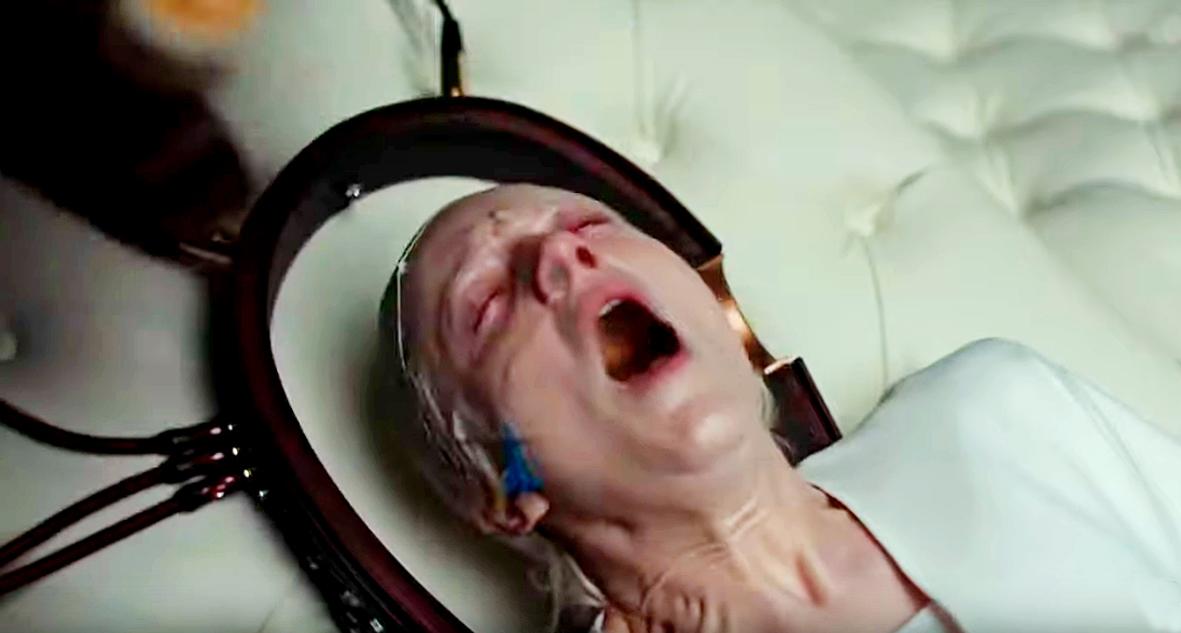Releasing a horror film in 2020 presents a challenge: how do you compete with a deadly pandemic, raging protests over racism and the most viciously polarized US election in recent memory?
For Brandon Cronenberg — son of legendary director David Cronenberg — making an ultra-violent movie about corporate assassins who control other people’s bodies through mind-hacking technology felt more appropriate than ever.
“If you look at Russian interference in the US elections, I think we’re only just now starting to realize what it means to be a completely online society,” he said of Possessor: Uncut.

Photo: YouTube Screengrab
“We’re all in a sense hackable, and there’s no way to close that door. That is human society now, and it will be interesting and possibly terrifying going forward to see what that means.”
The movie follows cerebral hitwoman Tasya Vos (Andrea Riseborough) as she takes over an oblivious victim (Christopher Abbott) and launches him into a horrific murder spree targeting an Orwellian CEO played by Sean Bean, who appeared in Game of Thrones.
Released in theaters today by NEON — behind last year’s historic Oscar winner Parasite — it has received rave reviews, but does not stint on highly graphic depictions of violence.
Hardened critics gasped during its January world premiere at the Sundance film festival.
“Violence in films should be visceral and disturbing — it’s more unsettling to me to see a PG-13 action film where 100 people die and nobody bleeds,” said Cronenberg.
“If you’re not taking violence seriously as a filmmaker, you’re trivializing it. I think that is a more dubious position than showing it explicitly.”
‘DEATH OF PRIVACY’
The film imagines an alternate, dystopian version of our present, in which “physically controlling the brain through electrical impulses” has become a reality.
It is a vision familiar to fans of Black Mirror — a dark tech-focused TV series that “has kind of cornered the market on this near-future sci-fi satire, and become a genre, in and of itself,” Cronenberg said.
One episode of Black Mirror saw police investigate murders through literally downloading the image memories of potential witnesses.
In Cronenberg’s film, the killers taking control of their victims’ bodies “stands in as a metaphor for that kind of surveillance,” said the director.
He wrote his film during the high-profile leaks from Edward Snowden, a former US intelligence contractor who revealed a National Security Agency mass surveillance program.
“I was feeling very angry about the death of privacy through technology, and the fact that governments were willing to violate privacy to that degree,” Cronenberg said.
‘MORE HATE’
The movie’s eye-popping gore will come as no surprise to viewers familiar with the haunting work of Cronenberg’s father.
David Cronenberg pioneered “body horror” including Oscar-winning mutant sci-fi The Fly, and directed the controversial Crash — a thriller about sexual arousal and car crashes that won a special Cannes festival prize.
But its stars insist the gruesome depictions of Possessor are justified.
Riseborough said the film’s violence is “honest,” but added: “The morality of whether that should or shouldn’t then be represented externally, or on screen, is sort of a different question.”
Cronenberg admitted: “I thought we would be getting more hate.”

Cheng Ching-hsiang (鄭青祥) turned a small triangle of concrete jammed between two old shops into a cool little bar called 9dimension. In front of the shop, a steampunk-like structure was welded by himself to serve as a booth where he prepares cocktails. “Yancheng used to be just old people,” he says, “but now young people are coming and creating the New Yancheng.” Around the corner, Yu Hsiu-jao (饒毓琇), opened Tiny Cafe. True to its name, it is the size of a cupboard and serves cold-brewed coffee. “Small shops are so special and have personality,” she says, “people come to Yancheng to find such treasures.” She

In July of 1995, a group of local DJs began posting an event flyer around Taipei. It was cheaply photocopied and nearly all in English, with a hand-drawn map on the back and, on the front, a big red hand print alongside one prominent line of text, “Finally… THE PARTY.” The map led to a remote floodplain in Taipei County (now New Taipei City) just across the Tamsui River from Taipei. The organizers got permission from no one. They just drove up in a blue Taiwanese pickup truck, set up a generator, two speakers, two turntables and a mixer. They

Former Chinese Nationalist Party (KMT) chairwoman Hung Hsiu-chu’s (洪秀柱) attendance at the Chinese Communist Party’s (CPP) “Chinese People’s War of Resistance Against Japanese Aggression and the World Anti-Fascist War” parade in Beijing is infuriating, embarrassing and insulting to nearly everyone in Taiwan, and Taiwan’s friends and allies. She is also ripping off bandages and pouring salt into old wounds. In the process she managed to tie both the KMT and the Democratic Progressive Party (DPP) into uncomfortable knots. The KMT continues to honor their heroic fighters, who defended China against the invading Japanese Empire, which inflicted unimaginable horrors on the

Hannah Liao (廖宸萱) recalls the harassment she experienced on dating apps, an experience that left her frightened and disgusted. “I’ve tried some voice-based dating apps,” the 30-year-old says. “Right away, some guys would say things like, ‘Wanna talk dirty?’ or ‘Wanna suck my d**k?’” she says. Liao’s story is not unique. Ministry of Health and Welfare statistics show a more than 50 percent rise in sexual assault cases related to online encounters over the past five years. In 2023 alone, women comprised 7,698 of the 9,413 reported victims. Faced with a dating landscape that can feel more predatory than promising, many in